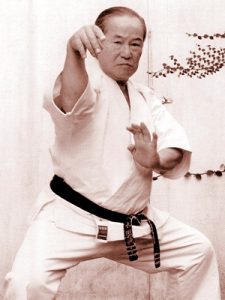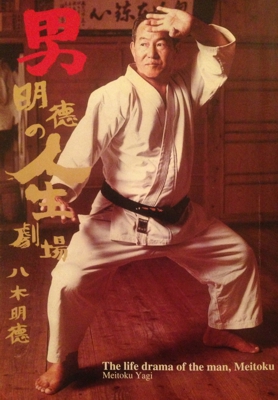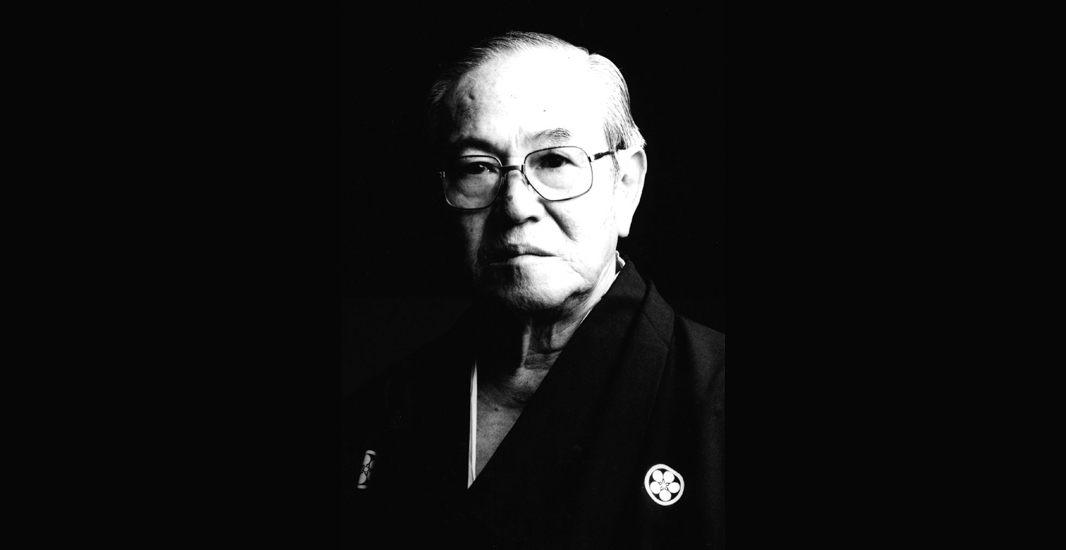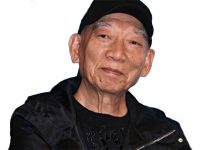Meitoku Yagi was born on March 6, 1912 in Kome, Naha City, Okinawa. He was Chinese and his family can be traced back to 36 Chinese families who immigrated to Okinawa from China in 1392. A karate master and teacher, he learned Goju-ryu from its legendary founder Chojun Miyagi. Yagi was named a Living National Treasure (ningen kokuho) for his contributions to the martial arts by Emperor Hirohito on April 29, 1986.
Meitoku Yagi teacher, Chojun Miyagi, died in 1953, and Yagi then opened his own dojo in the Daido district of Naha. He called his school Goju-ryu Meibukan, which means house of the pure minded warrior. Meitoku Yagi used the first kanji in his given name, 明 (Mei), for the name and crest of his school. These have several meanings, including purity. Made up of the kanji for sun and the kanji for moon, reflecting the duality of nature inherent to Goju-ryu. The main headquarters for the Meibukan school are in the Kume district of Naha. Meitoku Yagi’s primary goal for his students was that they promote peace, be good people and contribute to society.
 Meitoku Yagi began developing a series of kata, called Meibuken kata, in the 1970s and 1980s. The first kata in the series is Tenchi, which means “heaven and earth.” Originally two kata, Fukyu kata ichi and Fukyu kata ni, were put together so when two karateka performed each half, an attack in the first kata would correspond with a block in the second. The Meibuken kata are different from the kata in the Goju-ryu in many ways, reflecting Yagi Sensei’s Chinese roots and his time studying in China. For example, practitioners will use vertical closed hand chambers, and a different yoi position.
Meitoku Yagi began developing a series of kata, called Meibuken kata, in the 1970s and 1980s. The first kata in the series is Tenchi, which means “heaven and earth.” Originally two kata, Fukyu kata ichi and Fukyu kata ni, were put together so when two karateka performed each half, an attack in the first kata would correspond with a block in the second. The Meibuken kata are different from the kata in the Goju-ryu in many ways, reflecting Yagi Sensei’s Chinese roots and his time studying in China. For example, practitioners will use vertical closed hand chambers, and a different yoi position.
The other four Meibuken kata represent the four guardians of the cardinal directions in Chinese mythology. As with Ten no kata and Chi no kata, the other four kata also pair up to show the kata’s bunkai. Seiryu (East, Blue Dragon) and Byakko (West, White Tiger) go together, and Shujakku (South, Red Phoenix) and Genbu (North, Black Tortoise) go together. These are the English names used for the kata, Meitoku Yagi once said that he never specifically chose colors for the animals.
 In 2000, Meitoku Yagi released an autobiography entitled The Life Drama of the Man, Meitoku.
In 2000, Meitoku Yagi released an autobiography entitled The Life Drama of the Man, Meitoku.
Meitoku Yagi was still performing demonstrations of kata in 2002 when he was 91 years old.
Meitoku Yagi died on February 7, 2003. At the time of his death he was considered to be the most senior Karateka in the world.
Meitoku Yagi was an Advisor for the All Okinawa Karate-do Federation and Honorary Chairman for the Okinawa Karate-do Goju Kai. He was also an Honorary Chairman for the Goju Ryu Meibukai and an Elder Authority for the Okinawa Prefecture Karate-do Federation.
- March 6th, 45th Year of Meiji (1912): Born Kome, Naha City
- February 4, 2nd Year of Showa (1927): began training with Grandmaster Chojun Miyagi
- March, 7 Year of Showa (1932): graduated from Prefecture 2nd High School
- July, 9th year of Showa (1934): finished the tour of duty from the 23rd Company of the Capital Infantry
- August, 9th Year of Showa (1934): started working at water plant of Naha City
- June, 10th Year of Showa (1935): started working at the pharmacy of “San Hing Tong” Hospital
- December 13th, 11th Year of Showa (1936): started working at “Ming Chu” Mining in Taiwan; started training in Taiwan Kungfu.
- July, 13th Year of Showa (1938): started position in the Prefecture’s Police Department
- from October, 26th Year of Showa (1951): started positions as officer, superintendent and
- Director at the Ryukyu Custom Office
- 27th Year of Showa (1952): opened dojo
- 31st Year of Showa (1956): selected as Chairman of the newly established Okinawa Karate-do Goju Kai
- 47th Year of Showa (1972): retired from the Public Service
- 50th and 54th Year of Showa (1975 & 1979): Consultant of All Okinawa Karate-do Federation
- 54th and 57th Year of Showa (1979 & 1982): Chairman of All Okinawa Karate-do Federation
Advisory and Honorary Positions:
- Advisor and Honorary Chairman of Okinawa Karate-do Goju Kai
- Honorary Chairman of Goju Ryu Meibukai
- Honorary Chairman of Cheng Family Clan in Okinawa
- April, 61st Year of Showa (1986): Fourth Order of Merit from the Emperor Hirohito
- November, 4th Year of Heisei (1992): Invited to demonstrated Karate at the reopening of the Shuri Castle
- February, 5th Year of Heisei (1993) : recipient of the 1st Okinawan Karate-do award
- August, 9th Year of Heisei (1997): Recognized as Okinawa Prefecture’s Intangible Cultural Asset
Translated by Poon Chan February 14th 2000










